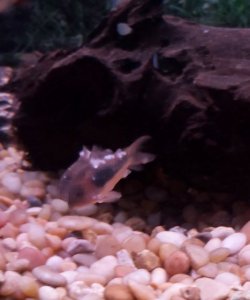The603
Fishaholic
Can anyone offer any advice as to what is wrong with my Cory Cats? Two out of five have it so far.
Tank size: 55 gallons
tank age: 9 months running
pH: 6.6 to 6.8
ammonia: 0
nitrite: 0
nitrate: @ 40 PPM
kH: not sure
gH: 29 PPM/2 gpg
tank temp: 74° F
Fish Symptoms (include full description including lesion, color, location, fish behavior): White bumps on their backs and bellies, acting and eating as if nothing is wrong.
Volume and Frequency of water changes: 30% every two weeks.
Chemical Additives or Media in your tank: Seachem Prime for water changes, activated carbon in my canister filter.
Tank inhabitants: 5 Emerald Cory Cats, 5 Buenos Aries Tetras, 5 Red Eye Tetras, 6 Zebra Danios, 1 Clown Pleco
Recent additions to your tank (living or decoration): Malaysian Driftwood (7/31/21)
Exposure to chemicals: None
Thanks
Gary
Tank size: 55 gallons
tank age: 9 months running
pH: 6.6 to 6.8
ammonia: 0
nitrite: 0
nitrate: @ 40 PPM
kH: not sure
gH: 29 PPM/2 gpg
tank temp: 74° F
Fish Symptoms (include full description including lesion, color, location, fish behavior): White bumps on their backs and bellies, acting and eating as if nothing is wrong.
Volume and Frequency of water changes: 30% every two weeks.
Chemical Additives or Media in your tank: Seachem Prime for water changes, activated carbon in my canister filter.
Tank inhabitants: 5 Emerald Cory Cats, 5 Buenos Aries Tetras, 5 Red Eye Tetras, 6 Zebra Danios, 1 Clown Pleco
Recent additions to your tank (living or decoration): Malaysian Driftwood (7/31/21)
Exposure to chemicals: None
Thanks
Gary


